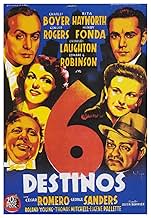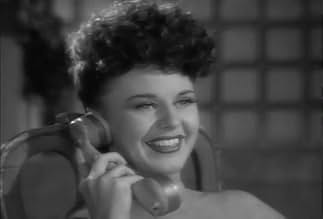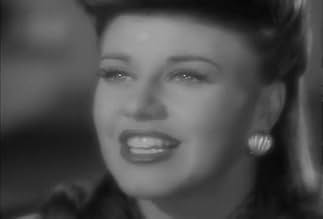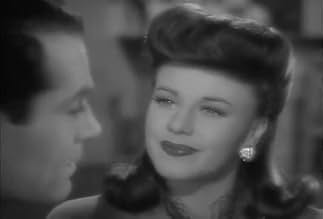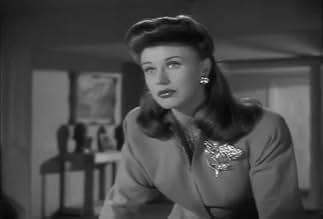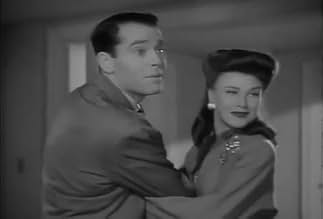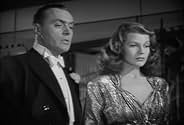NOTE IMDb
7,3/10
2,7 k
MA NOTE
Ajouter une intrigue dans votre langueA formal tailcoat that gets passed from one owner to another affects each life in a significant way.A formal tailcoat that gets passed from one owner to another affects each life in a significant way.A formal tailcoat that gets passed from one owner to another affects each life in a significant way.
- Réalisation
- Scénario
- Casting principal
- Récompenses
- 7 victoires au total
Avis à la une
This film's cast is so amazing you're going to expect it to be a perfect 10. You will most likely love some vignettes and only like others. You will be glad you watched and will be entertained.
The movements of an accursed tail coat about the Big City, and the lives of those who use it, becomes part of the TALES OF MANHATTAN.
Fox Studios and director Julien Duvivier fashioned this most enjoyable film. The idea of the tail coat never becomes silly or gets in the way of the plot, which doles out equal amounts of irony, suspense, pathos & comedy. The all-star cast gives worthy performances which keeps the viewer's attention right to the very end.
SEQUENCE ONE An actor and his lover (Charles Boyer & Rita Hayworth) are confronted by her quietly sadistic husband (Thomas Mitchell). Eugene Palette plays Boyer's loyal valet. An unbilled Robert Greig appears as the corpulent creator of the elegant tail coat.
Most of the action in this sequence takes place at an estate outside of Manhattan.
SEQUENCE TWO A shy fellow (Henry Fonda) tries to help his friend (Cesar Romero) out of a jam with his suspicious fiancé (Ginger Rogers). Gail Patrick appears as Rogers' nosy gal pal; Roland Young plays Romero's protective valet.
A quite different tail coat is the center of the plot here, which can become a bit confusing.
SEQUENCE THREE A poor composer (Charles Laughton) finally has the opportunity to conduct his magnum opus at a concert. Radiant Elsa Lanchester appears as Laughton's adoring wife. Christian Rub plays a friendly cellist, while Victor Francen is very believable as the noble Bellini. An unbilled Dewey Robinson plays the bullying owner of a small café.
Laughton is magnificent, as is to be expected, giving another master class in how to turn a small part into something very special.
SEQUENCE FOUR
After being spiffed-up and accoutered in the tail coat, a skid row bum (Edward G. Robinson) makes a poignant appearance at the Waldorf-Astoria for his college's 25-year class reunion. James Gleason plays the kindly parson who runs a rescue mission; silent screen star Mae Marsh appears as his sweet-natured wife. Harry Davenport appears as a wise old professor; George Sanders snarls his way through his role as Robinson's old antagonist.
Robinson & Gleason do some impressive acting, making their characters come alive.
SEQUENCE FIVE
An eccentric professor (W.C. Fields) gives a temperance lecture to a gathering of high society swells, not knowing that the coconut milk has been liberally spiked. Phil Silvers shines in the brief role of the secondhand dealer who sells the tail coat to Fields. The monumental Margaret Dumont enlivens her scant appearance as the matron sponsoring Fields.
Before the film's initial release, there was consternation from some of the other major stars concerning Fields' large salary. The clamor grew to the point that Fox weaseled out by simply excising the sequence entirely. Rumor was allowed to grow that the removal was due to an inept performance from Fields. This is tragic, in that it was to be one of Fields' final appearances on film and he is hilarious, as is Phil Silvers (who has the distinction of being practically the only person in film history who ever managed to both outtalk & hoodwink Fields). After more than half a century, this sequence has finally been reunited with the rest of the film--the only problem, for anyone that cares, being a slight one of continuity, as it is not shown how the tail coat returns to the Santelli Bros. shop in time for the burglary that opens Sequence Six.
You have to be quick to read the painted sign on the Santelli Bros. window: WE TAKE AN ABSOLUTE LOSS ON EVERY TRANSACTION WE'RE ECCENTRIC
SEQUENCE SIX
In the film's most photographically stylish sequence, a shanty town full of impoverished farmers rejoice when the tail coat--and its pocket full of cash--literally falls out of the sky. J. Carrol Naish plays the airborne robber who loses the coat. Paul Robeson & Ethel Waters are the couple who find it. Eddie 'Rochester' Anderson is their gently conniving preacher; an almost unrecognizable Clarence Muse appears as a greedy old grandfather. Members of the wonderful Hall Johnson Choir lift their voices as the jubilant townsfolk.
Once again, the action in this sequence mostly occurs far from Manhattan. The short song at the very end is the only occasion Robeson and The Hall Johnson Choir ever sang together on film--and, unbelievably, Miss Waters isn't allowed to sing at all.
********************
Director Duvivier and stars Boyer, Robinson & Mitchell would travel to Universal Studios to make another sequential film, FLESH AND FANTASY, in 1943.
Fox Studios and director Julien Duvivier fashioned this most enjoyable film. The idea of the tail coat never becomes silly or gets in the way of the plot, which doles out equal amounts of irony, suspense, pathos & comedy. The all-star cast gives worthy performances which keeps the viewer's attention right to the very end.
SEQUENCE ONE An actor and his lover (Charles Boyer & Rita Hayworth) are confronted by her quietly sadistic husband (Thomas Mitchell). Eugene Palette plays Boyer's loyal valet. An unbilled Robert Greig appears as the corpulent creator of the elegant tail coat.
Most of the action in this sequence takes place at an estate outside of Manhattan.
SEQUENCE TWO A shy fellow (Henry Fonda) tries to help his friend (Cesar Romero) out of a jam with his suspicious fiancé (Ginger Rogers). Gail Patrick appears as Rogers' nosy gal pal; Roland Young plays Romero's protective valet.
A quite different tail coat is the center of the plot here, which can become a bit confusing.
SEQUENCE THREE A poor composer (Charles Laughton) finally has the opportunity to conduct his magnum opus at a concert. Radiant Elsa Lanchester appears as Laughton's adoring wife. Christian Rub plays a friendly cellist, while Victor Francen is very believable as the noble Bellini. An unbilled Dewey Robinson plays the bullying owner of a small café.
Laughton is magnificent, as is to be expected, giving another master class in how to turn a small part into something very special.
SEQUENCE FOUR
After being spiffed-up and accoutered in the tail coat, a skid row bum (Edward G. Robinson) makes a poignant appearance at the Waldorf-Astoria for his college's 25-year class reunion. James Gleason plays the kindly parson who runs a rescue mission; silent screen star Mae Marsh appears as his sweet-natured wife. Harry Davenport appears as a wise old professor; George Sanders snarls his way through his role as Robinson's old antagonist.
Robinson & Gleason do some impressive acting, making their characters come alive.
SEQUENCE FIVE
An eccentric professor (W.C. Fields) gives a temperance lecture to a gathering of high society swells, not knowing that the coconut milk has been liberally spiked. Phil Silvers shines in the brief role of the secondhand dealer who sells the tail coat to Fields. The monumental Margaret Dumont enlivens her scant appearance as the matron sponsoring Fields.
Before the film's initial release, there was consternation from some of the other major stars concerning Fields' large salary. The clamor grew to the point that Fox weaseled out by simply excising the sequence entirely. Rumor was allowed to grow that the removal was due to an inept performance from Fields. This is tragic, in that it was to be one of Fields' final appearances on film and he is hilarious, as is Phil Silvers (who has the distinction of being practically the only person in film history who ever managed to both outtalk & hoodwink Fields). After more than half a century, this sequence has finally been reunited with the rest of the film--the only problem, for anyone that cares, being a slight one of continuity, as it is not shown how the tail coat returns to the Santelli Bros. shop in time for the burglary that opens Sequence Six.
You have to be quick to read the painted sign on the Santelli Bros. window: WE TAKE AN ABSOLUTE LOSS ON EVERY TRANSACTION WE'RE ECCENTRIC
SEQUENCE SIX
In the film's most photographically stylish sequence, a shanty town full of impoverished farmers rejoice when the tail coat--and its pocket full of cash--literally falls out of the sky. J. Carrol Naish plays the airborne robber who loses the coat. Paul Robeson & Ethel Waters are the couple who find it. Eddie 'Rochester' Anderson is their gently conniving preacher; an almost unrecognizable Clarence Muse appears as a greedy old grandfather. Members of the wonderful Hall Johnson Choir lift their voices as the jubilant townsfolk.
Once again, the action in this sequence mostly occurs far from Manhattan. The short song at the very end is the only occasion Robeson and The Hall Johnson Choir ever sang together on film--and, unbelievably, Miss Waters isn't allowed to sing at all.
********************
Director Duvivier and stars Boyer, Robinson & Mitchell would travel to Universal Studios to make another sequential film, FLESH AND FANTASY, in 1943.
This is one of the better multiple story movies from Hollywood, though it demonstrates the limitations of the genre as well as it's strengths. At it's best, this kind of movie manages to integrate the stories in some way (think of the plot of GRAND HOTEL or DINNER AT EIGHT, where the problems of different groups of characters manage to intertwine in a confined space - another example (though a non-Hollywood film) is the British horror classic DEAD OF NIGHT). Some of the anthology films based on the stories of a particular writer (O'Henry or Somerset Maugham for instance) don't have to blend the stories because of the style of the writer, which unifies the different stories. But then you have a well made film like this one, with a good journeyman director (Jules Duvivier, who had previously done the similar FLESH AND FANTASY), and an all name cast to die for. This is the only film that had Charles Boyer, Rita Hayworth, Thomas Mitchell, Roland Young, Eugene Pallette, Henry Fonda, Ginger Rogers, Cesar Romero, Charles Laughton, Elsa Lanchester, Victor Francken, Edward G. Robinson, James Gleason, George Sanders, W.C.Fields, Margaret Dumont, Phil Silvers, J. Carroll Naish, Paul Robeson, Ethel Waters, Eddie Anderson, and Clarence Muse in one picture - even though they were in different stories.
But the running thread is weak. It is the passing of a "monkey suit" back and forth from one leading character to another - a pun on "tales" and "tails" (which is what such an elaborate tuxedo is called). That the actors who get the "tails" (Boyer, Romero, Laughton, Robinson, Fields) do not fit the same size clothes does not seem to be taken into consideration. Interestingly, Laughton did lose weight for the role, but he still is burlier than Boyer or Romero. As for the final recipients of the "tails" (Naish and Robeson), the former is a crook who wears the suit briefly while pulling off the robbery of a casino, and then uses the suit as a container for the stolen cash, and the latter never cares about the coat, but is mostly concerned with the cash that is dropped down inside it. The "tails" end up being used on a scarecrow on Robeson's farm.
It is a silly device to use, and the ending (an all African-American episode about how a rural town of African - Americans finds the "tails" containing stolen cash (dropped from a plane by J. Carroll Naish). As the characters in the other stories were all whites in the upper classes (even the now impoverished Robinson was once a successful attorney, and Fields is a social climber/ fake lecturer on the dangers of drinking. The Blacks in the film are definitely in the lower classes. What is unique about their segment is that the money that Robeson finds is not kept (as he would have done) by him but split into shares for every Black person in the town - a "Marxist" kind of solution that fits with Robeson's political views in the late 1940s and early 1950s. Dramatically the two best stories are the ones about Robinson pretending that he is not an impoverished bum, when attending the reunion of his college classmates (one of whom, Sanders, is an old rival who suspects the truth), and the first story about the purchase of the cursed set of "tails" by Boyer, and his subsequent discovery of the unworthiness of his lover Hayworth (who is left humiliated with her husband Mitchell). The continental flavor of Boyer's sequence may be the portion of the film based on a script of Ferenc Molnar's. The Laughton sequence is okay, but nothing to rave about (although the role of Victor Francken as the tempermental symphony conductor - who helps Laughton - is a clone of "Toscanini", down to the name of the character - "ARTURO Belini". The weakest is the Fonda - Rogers - Romero sequence, which should have been better (and the fine screen attraction of Fonda and Rogers makes one wish that they made a complete film together - tragically this segment was their only film together). The Naish sequence is too brief to be judged well, though Naish does exude menace as a thief.
That leaves the famous "lost" sequence of Fields and Margaret Dumont. It really was never fully lost - for many years film societies showing "Fields" specialties would show that sequence like a short. But it is not complete as it survives. How did Margaret Dumont get her head stuck in the chandelier that she is wearing? That is not in the final sequence that the video version of the movie includes.
It was their second movie together. Fields own NEVER GIVE A SUCKER AN EVEN BREAK included his romancing Dumont (as the wealthy Mrs. Hemoglobin) despite the rivalry of Leon Erroll. That film was made in 1941, and perhaps Fields suggested reteaming with Dumont. She is a good foil for him, but nothing else (and nobody else) at the lecture is worthy of Fields' typical shafts of wit. The only other to stand out (at all) in the lecture portion of the sequence is Chester Clute, the alcoholic husband of Dumont, and he does not confront Fields.
But earlier in the sequence is a worthy adversary - in fact the only worthy adversary Fields ever had in a congame confrontation: Phil Silvers. As this was one of Fields last movies, it was one of Silvers first films. Television's future "Sergeant Bilko" had begun to perfect his style of flim-flam and fast talk, and it is a treat of sorts watching him con Fields into paying for the "tails" by putting a fake wad of bills in the coat (so Fields thinks he's getting the better of Silvers in the deal). A bit like watching the passing of a crown between champions of their days.
But the running thread is weak. It is the passing of a "monkey suit" back and forth from one leading character to another - a pun on "tales" and "tails" (which is what such an elaborate tuxedo is called). That the actors who get the "tails" (Boyer, Romero, Laughton, Robinson, Fields) do not fit the same size clothes does not seem to be taken into consideration. Interestingly, Laughton did lose weight for the role, but he still is burlier than Boyer or Romero. As for the final recipients of the "tails" (Naish and Robeson), the former is a crook who wears the suit briefly while pulling off the robbery of a casino, and then uses the suit as a container for the stolen cash, and the latter never cares about the coat, but is mostly concerned with the cash that is dropped down inside it. The "tails" end up being used on a scarecrow on Robeson's farm.
It is a silly device to use, and the ending (an all African-American episode about how a rural town of African - Americans finds the "tails" containing stolen cash (dropped from a plane by J. Carroll Naish). As the characters in the other stories were all whites in the upper classes (even the now impoverished Robinson was once a successful attorney, and Fields is a social climber/ fake lecturer on the dangers of drinking. The Blacks in the film are definitely in the lower classes. What is unique about their segment is that the money that Robeson finds is not kept (as he would have done) by him but split into shares for every Black person in the town - a "Marxist" kind of solution that fits with Robeson's political views in the late 1940s and early 1950s. Dramatically the two best stories are the ones about Robinson pretending that he is not an impoverished bum, when attending the reunion of his college classmates (one of whom, Sanders, is an old rival who suspects the truth), and the first story about the purchase of the cursed set of "tails" by Boyer, and his subsequent discovery of the unworthiness of his lover Hayworth (who is left humiliated with her husband Mitchell). The continental flavor of Boyer's sequence may be the portion of the film based on a script of Ferenc Molnar's. The Laughton sequence is okay, but nothing to rave about (although the role of Victor Francken as the tempermental symphony conductor - who helps Laughton - is a clone of "Toscanini", down to the name of the character - "ARTURO Belini". The weakest is the Fonda - Rogers - Romero sequence, which should have been better (and the fine screen attraction of Fonda and Rogers makes one wish that they made a complete film together - tragically this segment was their only film together). The Naish sequence is too brief to be judged well, though Naish does exude menace as a thief.
That leaves the famous "lost" sequence of Fields and Margaret Dumont. It really was never fully lost - for many years film societies showing "Fields" specialties would show that sequence like a short. But it is not complete as it survives. How did Margaret Dumont get her head stuck in the chandelier that she is wearing? That is not in the final sequence that the video version of the movie includes.
It was their second movie together. Fields own NEVER GIVE A SUCKER AN EVEN BREAK included his romancing Dumont (as the wealthy Mrs. Hemoglobin) despite the rivalry of Leon Erroll. That film was made in 1941, and perhaps Fields suggested reteaming with Dumont. She is a good foil for him, but nothing else (and nobody else) at the lecture is worthy of Fields' typical shafts of wit. The only other to stand out (at all) in the lecture portion of the sequence is Chester Clute, the alcoholic husband of Dumont, and he does not confront Fields.
But earlier in the sequence is a worthy adversary - in fact the only worthy adversary Fields ever had in a congame confrontation: Phil Silvers. As this was one of Fields last movies, it was one of Silvers first films. Television's future "Sergeant Bilko" had begun to perfect his style of flim-flam and fast talk, and it is a treat of sorts watching him con Fields into paying for the "tails" by putting a fake wad of bills in the coat (so Fields thinks he's getting the better of Silvers in the deal). A bit like watching the passing of a crown between champions of their days.
This is a forgotten classic. It's funny, moving and old fashioned. Add the fact that it's chock full of stars and you have one fun movie to watch. Edward G. Robinson is a standout as a bum trying to make good. If you like old movies, try to hunt this one down.
The movie's a pretty good look at some of TCF's top stars of the day. The plot amounts to a series of vignettes that follow a dress coat as it gets passed around to a series of new owners. The trouble is the coat is supposed to be cursed so we expect some adversity to befall each new owner. Some vignettes, of course, are better than others. Personally I liked the Rogers- Fonda farcical 20-minutes best. On the other hand, I can see why the WC Fields episode was dropped from many versions since it's not the grouchy comedian at his best. (I also suspect the rather gross anatomical drawing behind his lectern didn't help.)
As a movie, it's certainly different, something of a showcase and, my gosh, was Rita Hayworth ever any lovelier than here. Pairing her with a pixie-ish Thomas Mitchell as a cuckolded husband was a masterstroke. Watch how slyly he asserts himself against the over-confident Boyer. Robinson gets the most extended screen time as a down-and-out lawyer trying to impress his old school chums. I'm just sorry we didn't get to hear more of Paul Robeson's wonderful bass voice in the final darktown jubilee section. Nonetheless, it's a sprightly and satisfying way to end the saga of the accursed dress coat.
The movie comes across today as an exception to the standard studio product, but is cleverly set up with a dash of humor and a touch of timeless human interest.
As a movie, it's certainly different, something of a showcase and, my gosh, was Rita Hayworth ever any lovelier than here. Pairing her with a pixie-ish Thomas Mitchell as a cuckolded husband was a masterstroke. Watch how slyly he asserts himself against the over-confident Boyer. Robinson gets the most extended screen time as a down-and-out lawyer trying to impress his old school chums. I'm just sorry we didn't get to hear more of Paul Robeson's wonderful bass voice in the final darktown jubilee section. Nonetheless, it's a sprightly and satisfying way to end the saga of the accursed dress coat.
The movie comes across today as an exception to the standard studio product, but is cleverly set up with a dash of humor and a touch of timeless human interest.
Le saviez-vous
- AnecdotesW.C. Fields appeared in a chapter which was cut from the final theatrical version. It had been restored to the 1996 VHS version. Also in the segment are Margaret Dumont Marcel Dalio, and Phil Silvers. However, when it was later on released in DVD, the Fields segment was deleted again.
- GaffesEven though the audience has seen a close-up of Charles Boyer's bullet wound behind the left side of his jacket, when he turns to say goodbye to Mitchell and Hayworth the left side of the jacket lifts, and there is no bloodstain.
- Citations
Paul Orman: What did you want to say about guns, Mr. Halloway?
John Halloway: Ever use 'em?
Paul Orman: Yes, on the stage.
Paul Orman: Shoot 'em?
John Halloway: On the stage.
John Halloway: Not real bullets?
Paul Orman: No.
John Halloway: Just blanks, eh?
Paul Orman: Yes, only blanks. We actors prefer them.
- Crédits fousThe following contains a restored sequence starring W.C. Fields which was not included in the original theatrical release of "Tales of Manhattan."
- Versions alternativesSome scenes featuring W.C. Fields were filmed but cut from the movie before release. The US video version restores this unseen footage. In this 9 minute sequence, Phil Silvers and Marcel Dalio played the Santelli Brothers who owned the used clothing store where Fields bought the dinner jacket. Margaret Dumont played a wealthy woman who hired Fields to give a lecture on the evils of alcohol. The J. Carroll Naish episode was filmed and substituted for the longer Fields episode after it was cut.
- ConnexionsFeatured in M.A.S.H.: Morale Victory (1980)
- Bandes originalesPerpetual Motion (Perpetuum mobile, Op. 257)
(uncredited)
Music by Johann Strauss
Played at the concert hall rehearsal
Meilleurs choix
Connectez-vous pour évaluer et suivre la liste de favoris afin de recevoir des recommandations personnalisées
- How long is Tales of Manhattan?Alimenté par Alexa
Détails
Box-office
- Budget
- 1 000 000 $US (estimé)
- Durée
- 1h 58min(118 min)
- Couleur
- Rapport de forme
- 1.37 : 1
Contribuer à cette page
Suggérer une modification ou ajouter du contenu manquant

